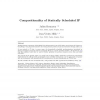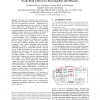1119 search results - page 143 / 224 » Computing in the Presence of Timing Failures |
ISI
2007
Springer
13 years 7 months ago
2007
Springer
—Detecting unknown malicious code (malcode) is a challenging task. Current common solutions, such as anti-virus tools, rely heavily on prior explicit knowledge of specific instan...
ENTCS
2008
13 years 7 months ago
2008
Timing Closure in presence of long global wire interconnects is one of the main current issues in System-onChip design. One proposed solution to the Timing Closure problem is Late...
EUROSYS
2006
ACM
14 years 4 months ago
2006
ACM
—Restoring data operations after a disaster is a daunting task: how should recovery be performed to minimize data loss and application downtime? Administrators are under consider...
ICALP
2009
Springer
14 years 8 months ago
2009
Springer
We give new algorithms for learning halfspaces in the challenging malicious noise model, where an adversary may corrupt both the labels and the underlying distribution of examples....
RTCSA
2008
IEEE
14 years 2 months ago
2008
IEEE
Real-time systems typically have to satisfy complex requirements, mapped to the task attributes, eventually guaranteed by the underlying scheduler. These systems consist of a mix ...


